Comparing Psychological and Sociological Schools of Thought in Adolescent Health and Social Care Issues
VerifiedAdded on 2023/06/17
|11
|2839
|275
AI Summary
This essay compares and contrasts psychological and sociological schools of thought in the context of adolescent health and social care issues. It explores behaviourism, gestalt psychology, humanistic psychology, and more.
Contribute Materials
Your contribution can guide someone’s learning journey. Share your
documents today.
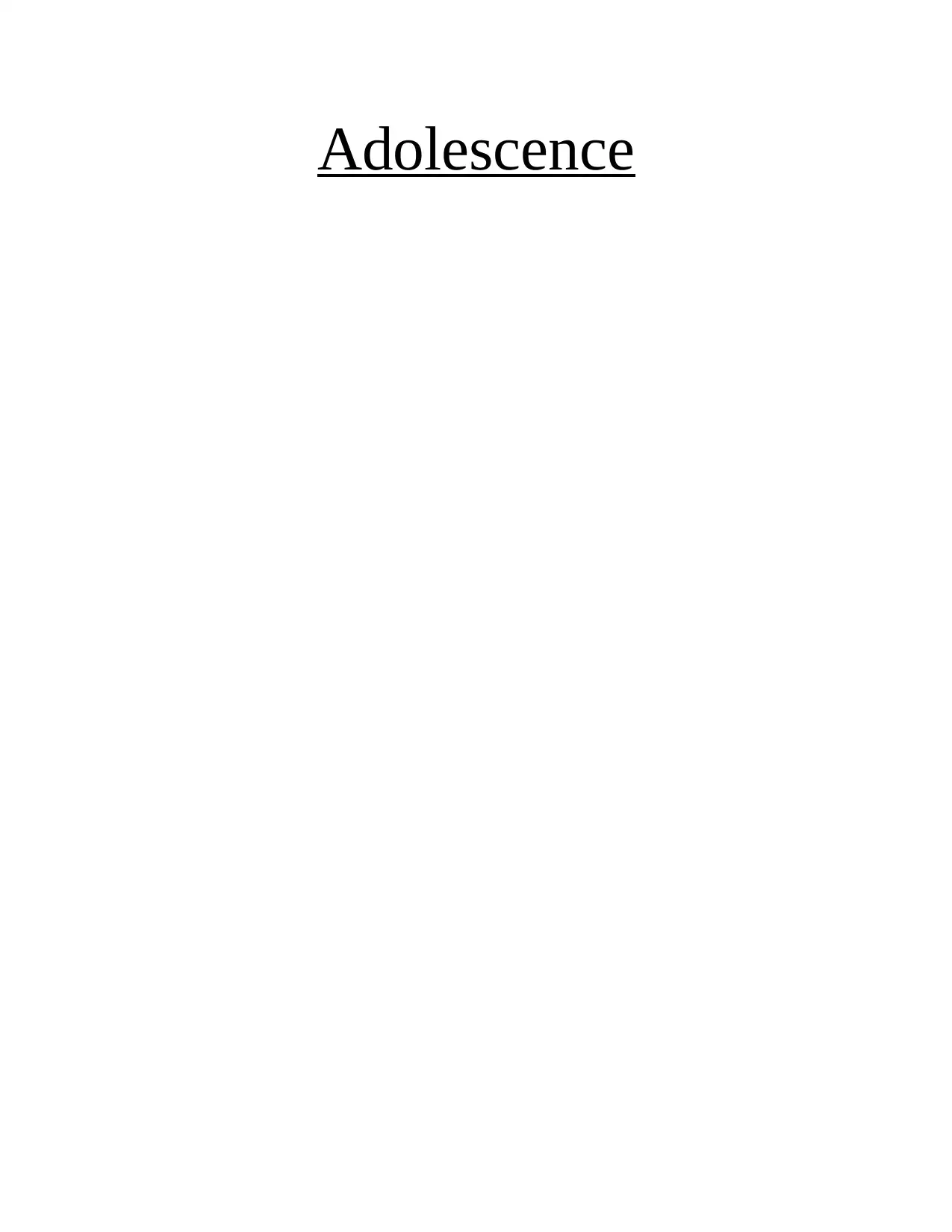
Adolescence
Secure Best Marks with AI Grader
Need help grading? Try our AI Grader for instant feedback on your assignments.

Table of Contents
INTRODUCTION...........................................................................................................................1
MAIN BODY...................................................................................................................................1
CONCLUSION................................................................................................................................6
References........................................................................................................................................7
INTRODUCTION...........................................................................................................................1
MAIN BODY...................................................................................................................................1
CONCLUSION................................................................................................................................6
References........................................................................................................................................7
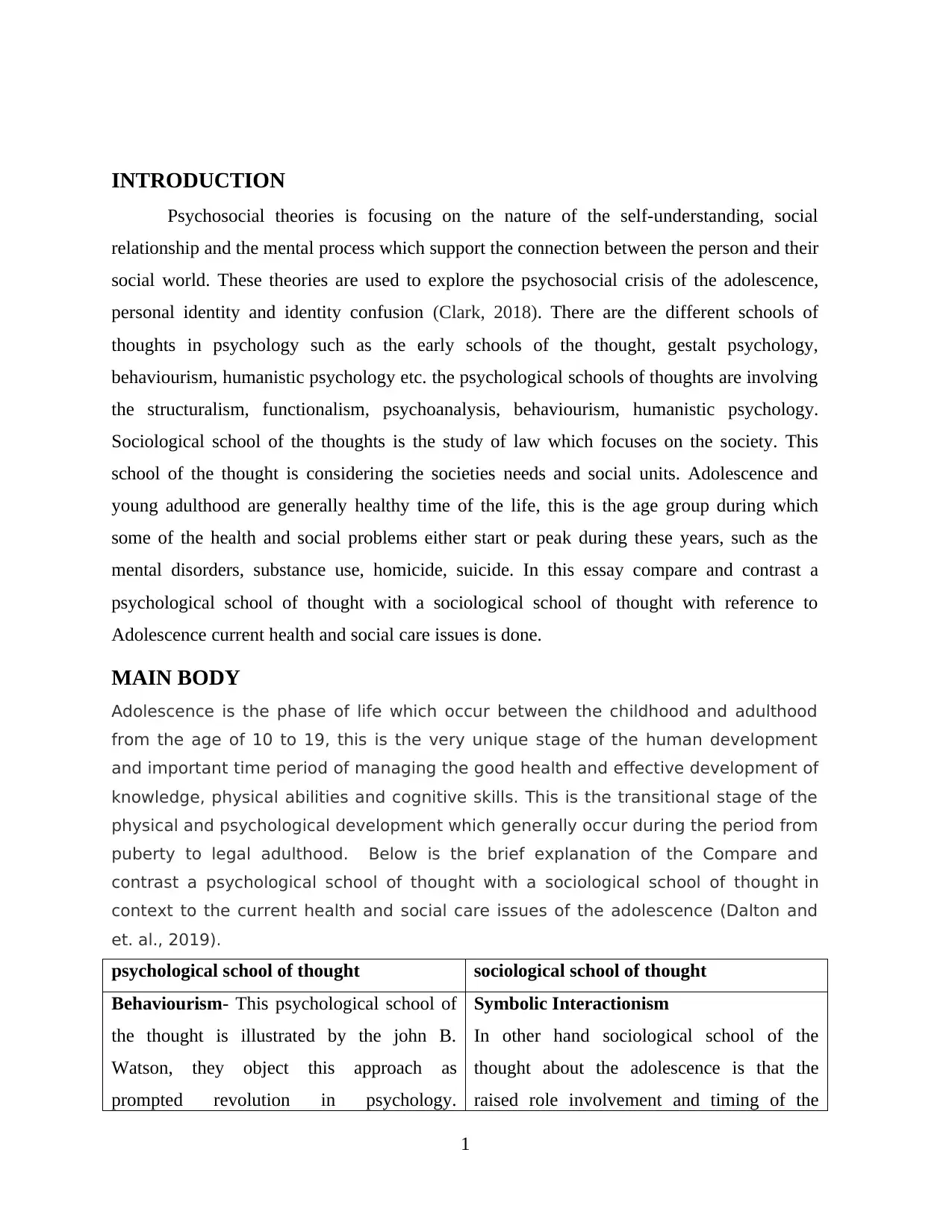
INTRODUCTION
Psychosocial theories is focusing on the nature of the self-understanding, social
relationship and the mental process which support the connection between the person and their
social world. These theories are used to explore the psychosocial crisis of the adolescence,
personal identity and identity confusion (Clark, 2018). There are the different schools of
thoughts in psychology such as the early schools of the thought, gestalt psychology,
behaviourism, humanistic psychology etc. the psychological schools of thoughts are involving
the structuralism, functionalism, psychoanalysis, behaviourism, humanistic psychology.
Sociological school of the thoughts is the study of law which focuses on the society. This
school of the thought is considering the societies needs and social units. Adolescence and
young adulthood are generally healthy time of the life, this is the age group during which
some of the health and social problems either start or peak during these years, such as the
mental disorders, substance use, homicide, suicide. In this essay compare and contrast a
psychological school of thought with a sociological school of thought with reference to
Adolescence current health and social care issues is done.
MAIN BODY
Adolescence is the phase of life which occur between the childhood and adulthood
from the age of 10 to 19, this is the very unique stage of the human development
and important time period of managing the good health and effective development of
knowledge, physical abilities and cognitive skills. This is the transitional stage of the
physical and psychological development which generally occur during the period from
puberty to legal adulthood. Below is the brief explanation of the Compare and
contrast a psychological school of thought with a sociological school of thought in
context to the current health and social care issues of the adolescence (Dalton and
et. al., 2019).
psychological school of thought sociological school of thought
Behaviourism- This psychological school of
the thought is illustrated by the john B.
Watson, they object this approach as
prompted revolution in psychology.
Symbolic Interactionism
In other hand sociological school of the
thought about the adolescence is that the
raised role involvement and timing of the
1
Psychosocial theories is focusing on the nature of the self-understanding, social
relationship and the mental process which support the connection between the person and their
social world. These theories are used to explore the psychosocial crisis of the adolescence,
personal identity and identity confusion (Clark, 2018). There are the different schools of
thoughts in psychology such as the early schools of the thought, gestalt psychology,
behaviourism, humanistic psychology etc. the psychological schools of thoughts are involving
the structuralism, functionalism, psychoanalysis, behaviourism, humanistic psychology.
Sociological school of the thoughts is the study of law which focuses on the society. This
school of the thought is considering the societies needs and social units. Adolescence and
young adulthood are generally healthy time of the life, this is the age group during which
some of the health and social problems either start or peak during these years, such as the
mental disorders, substance use, homicide, suicide. In this essay compare and contrast a
psychological school of thought with a sociological school of thought with reference to
Adolescence current health and social care issues is done.
MAIN BODY
Adolescence is the phase of life which occur between the childhood and adulthood
from the age of 10 to 19, this is the very unique stage of the human development
and important time period of managing the good health and effective development of
knowledge, physical abilities and cognitive skills. This is the transitional stage of the
physical and psychological development which generally occur during the period from
puberty to legal adulthood. Below is the brief explanation of the Compare and
contrast a psychological school of thought with a sociological school of thought in
context to the current health and social care issues of the adolescence (Dalton and
et. al., 2019).
psychological school of thought sociological school of thought
Behaviourism- This psychological school of
the thought is illustrated by the john B.
Watson, they object this approach as
prompted revolution in psychology.
Symbolic Interactionism
In other hand sociological school of the
thought about the adolescence is that the
raised role involvement and timing of the
1
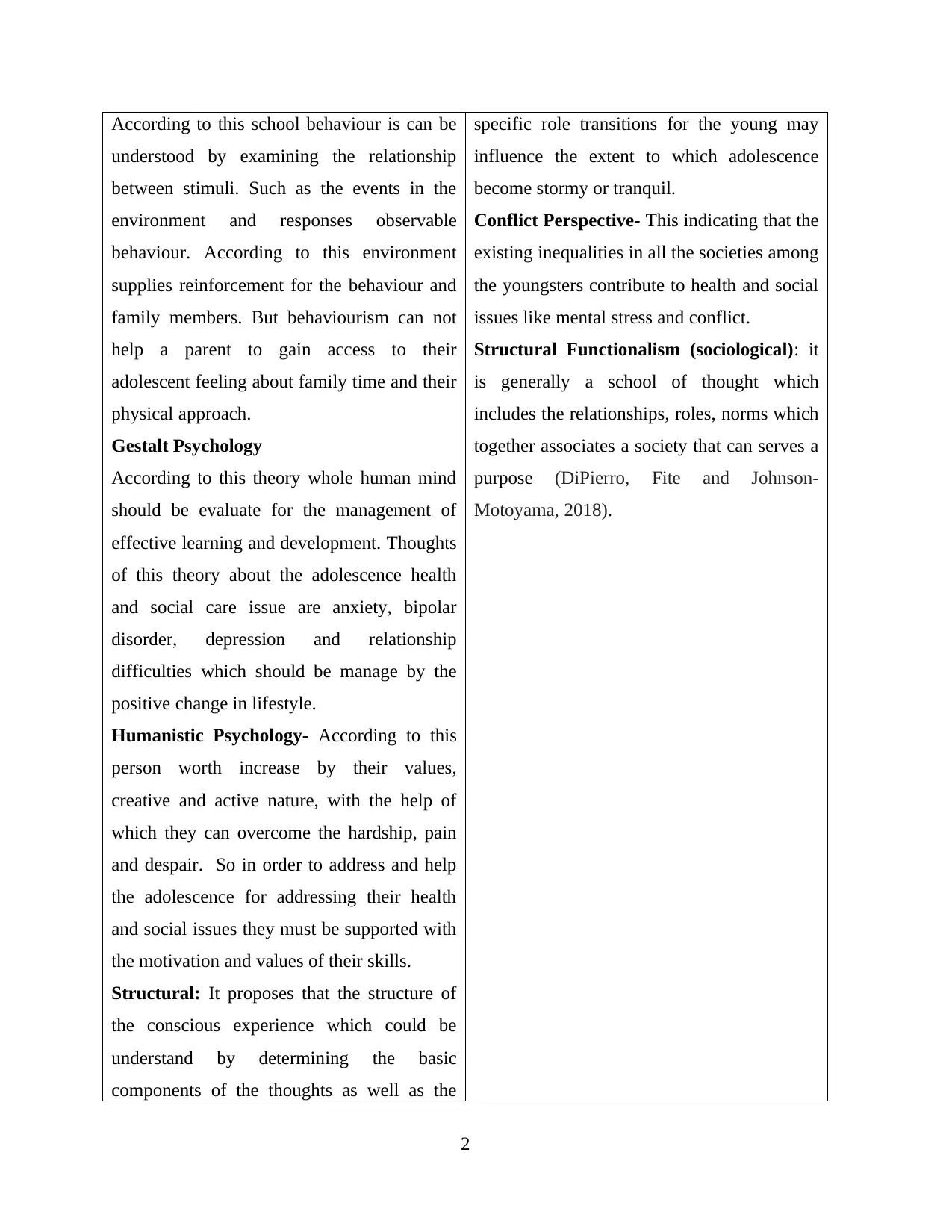
According to this school behaviour is can be
understood by examining the relationship
between stimuli. Such as the events in the
environment and responses observable
behaviour. According to this environment
supplies reinforcement for the behaviour and
family members. But behaviourism can not
help a parent to gain access to their
adolescent feeling about family time and their
physical approach.
Gestalt Psychology
According to this theory whole human mind
should be evaluate for the management of
effective learning and development. Thoughts
of this theory about the adolescence health
and social care issue are anxiety, bipolar
disorder, depression and relationship
difficulties which should be manage by the
positive change in lifestyle.
Humanistic Psychology- According to this
person worth increase by their values,
creative and active nature, with the help of
which they can overcome the hardship, pain
and despair. So in order to address and help
the adolescence for addressing their health
and social issues they must be supported with
the motivation and values of their skills.
Structural: It proposes that the structure of
the conscious experience which could be
understand by determining the basic
components of the thoughts as well as the
specific role transitions for the young may
influence the extent to which adolescence
become stormy or tranquil.
Conflict Perspective- This indicating that the
existing inequalities in all the societies among
the youngsters contribute to health and social
issues like mental stress and conflict.
Structural Functionalism (sociological): it
is generally a school of thought which
includes the relationships, roles, norms which
together associates a society that can serves a
purpose (DiPierro, Fite and Johnson-
Motoyama, 2018).
2
understood by examining the relationship
between stimuli. Such as the events in the
environment and responses observable
behaviour. According to this environment
supplies reinforcement for the behaviour and
family members. But behaviourism can not
help a parent to gain access to their
adolescent feeling about family time and their
physical approach.
Gestalt Psychology
According to this theory whole human mind
should be evaluate for the management of
effective learning and development. Thoughts
of this theory about the adolescence health
and social care issue are anxiety, bipolar
disorder, depression and relationship
difficulties which should be manage by the
positive change in lifestyle.
Humanistic Psychology- According to this
person worth increase by their values,
creative and active nature, with the help of
which they can overcome the hardship, pain
and despair. So in order to address and help
the adolescence for addressing their health
and social issues they must be supported with
the motivation and values of their skills.
Structural: It proposes that the structure of
the conscious experience which could be
understand by determining the basic
components of the thoughts as well as the
specific role transitions for the young may
influence the extent to which adolescence
become stormy or tranquil.
Conflict Perspective- This indicating that the
existing inequalities in all the societies among
the youngsters contribute to health and social
issues like mental stress and conflict.
Structural Functionalism (sociological): it
is generally a school of thought which
includes the relationships, roles, norms which
together associates a society that can serves a
purpose (DiPierro, Fite and Johnson-
Motoyama, 2018).
2
Secure Best Marks with AI Grader
Need help grading? Try our AI Grader for instant feedback on your assignments.
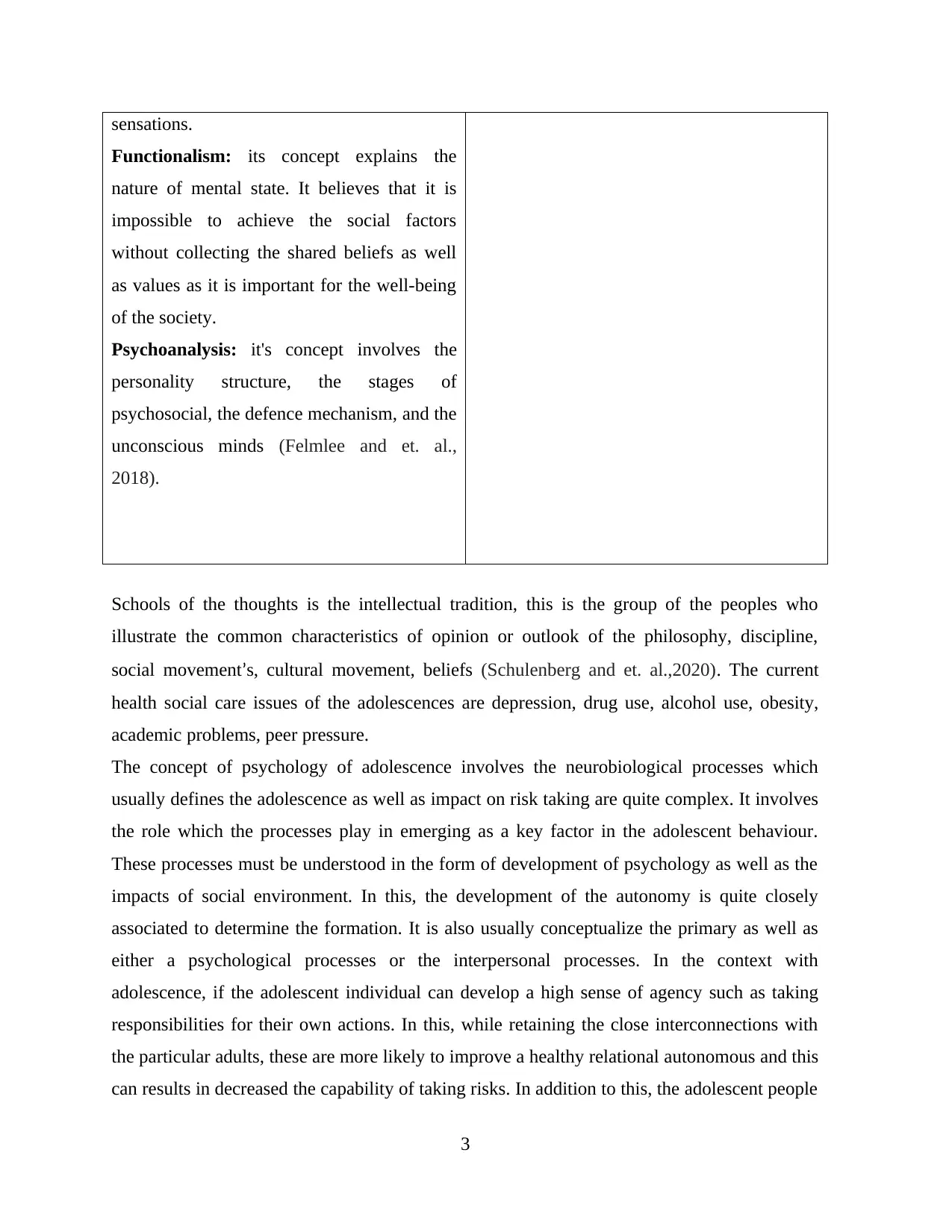
sensations.
Functionalism: its concept explains the
nature of mental state. It believes that it is
impossible to achieve the social factors
without collecting the shared beliefs as well
as values as it is important for the well-being
of the society.
Psychoanalysis: it's concept involves the
personality structure, the stages of
psychosocial, the defence mechanism, and the
unconscious minds (Felmlee and et. al.,
2018).
Schools of the thoughts is the intellectual tradition, this is the group of the peoples who
illustrate the common characteristics of opinion or outlook of the philosophy, discipline,
social movement’s, cultural movement, beliefs (Schulenberg and et. al.,2020). The current
health social care issues of the adolescences are depression, drug use, alcohol use, obesity,
academic problems, peer pressure.
The concept of psychology of adolescence involves the neurobiological processes which
usually defines the adolescence as well as impact on risk taking are quite complex. It involves
the role which the processes play in emerging as a key factor in the adolescent behaviour.
These processes must be understood in the form of development of psychology as well as the
impacts of social environment. In this, the development of the autonomy is quite closely
associated to determine the formation. It is also usually conceptualize the primary as well as
either a psychological processes or the interpersonal processes. In the context with
adolescence, if the adolescent individual can develop a high sense of agency such as taking
responsibilities for their own actions. In this, while retaining the close interconnections with
the particular adults, these are more likely to improve a healthy relational autonomous and this
can results in decreased the capability of taking risks. In addition to this, the adolescent people
3
Functionalism: its concept explains the
nature of mental state. It believes that it is
impossible to achieve the social factors
without collecting the shared beliefs as well
as values as it is important for the well-being
of the society.
Psychoanalysis: it's concept involves the
personality structure, the stages of
psychosocial, the defence mechanism, and the
unconscious minds (Felmlee and et. al.,
2018).
Schools of the thoughts is the intellectual tradition, this is the group of the peoples who
illustrate the common characteristics of opinion or outlook of the philosophy, discipline,
social movement’s, cultural movement, beliefs (Schulenberg and et. al.,2020). The current
health social care issues of the adolescences are depression, drug use, alcohol use, obesity,
academic problems, peer pressure.
The concept of psychology of adolescence involves the neurobiological processes which
usually defines the adolescence as well as impact on risk taking are quite complex. It involves
the role which the processes play in emerging as a key factor in the adolescent behaviour.
These processes must be understood in the form of development of psychology as well as the
impacts of social environment. In this, the development of the autonomy is quite closely
associated to determine the formation. It is also usually conceptualize the primary as well as
either a psychological processes or the interpersonal processes. In the context with
adolescence, if the adolescent individual can develop a high sense of agency such as taking
responsibilities for their own actions. In this, while retaining the close interconnections with
the particular adults, these are more likely to improve a healthy relational autonomous and this
can results in decreased the capability of taking risks. In addition to this, the adolescent people
3
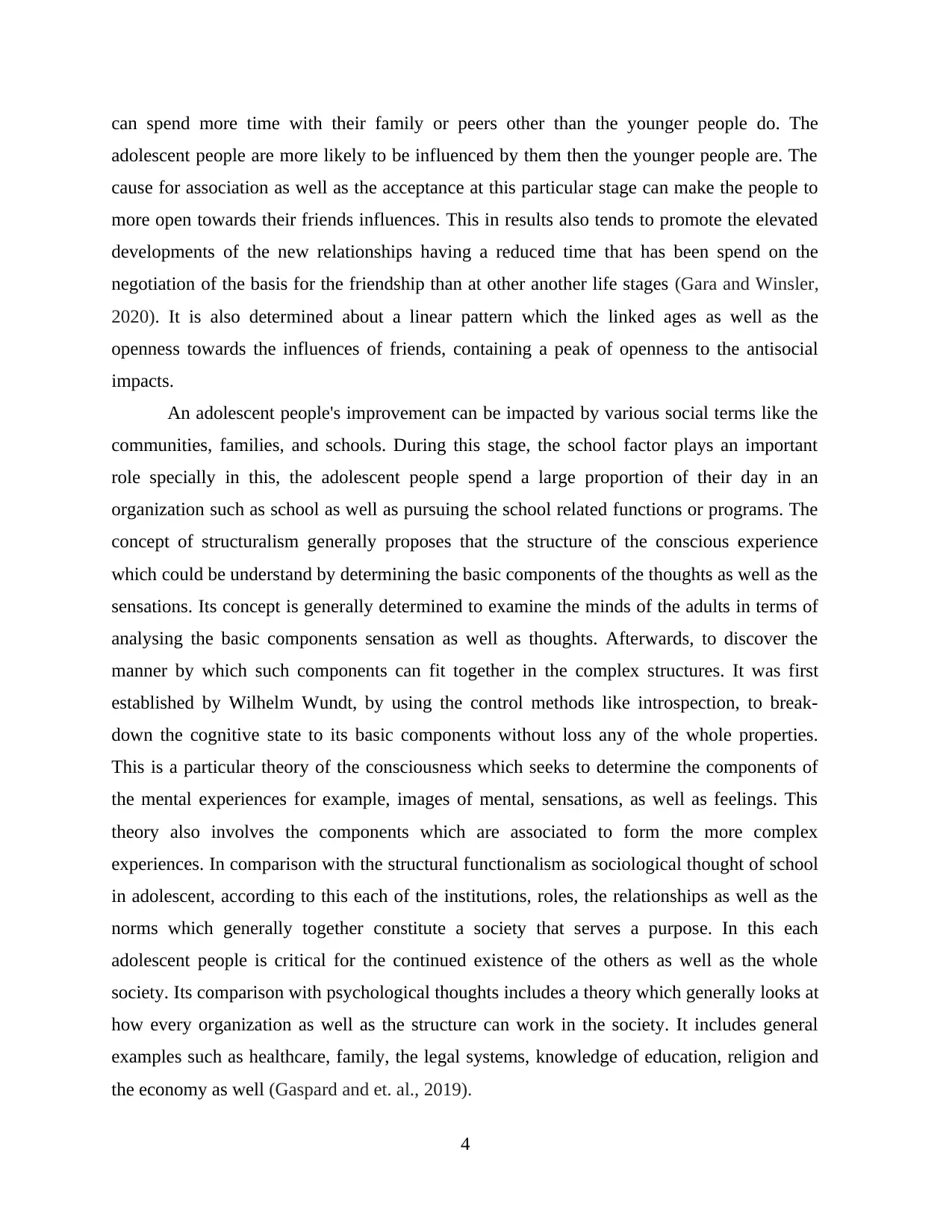
can spend more time with their family or peers other than the younger people do. The
adolescent people are more likely to be influenced by them then the younger people are. The
cause for association as well as the acceptance at this particular stage can make the people to
more open towards their friends influences. This in results also tends to promote the elevated
developments of the new relationships having a reduced time that has been spend on the
negotiation of the basis for the friendship than at other another life stages (Gara and Winsler,
2020). It is also determined about a linear pattern which the linked ages as well as the
openness towards the influences of friends, containing a peak of openness to the antisocial
impacts.
An adolescent people's improvement can be impacted by various social terms like the
communities, families, and schools. During this stage, the school factor plays an important
role specially in this, the adolescent people spend a large proportion of their day in an
organization such as school as well as pursuing the school related functions or programs. The
concept of structuralism generally proposes that the structure of the conscious experience
which could be understand by determining the basic components of the thoughts as well as the
sensations. Its concept is generally determined to examine the minds of the adults in terms of
analysing the basic components sensation as well as thoughts. Afterwards, to discover the
manner by which such components can fit together in the complex structures. It was first
established by Wilhelm Wundt, by using the control methods like introspection, to break-
down the cognitive state to its basic components without loss any of the whole properties.
This is a particular theory of the consciousness which seeks to determine the components of
the mental experiences for example, images of mental, sensations, as well as feelings. This
theory also involves the components which are associated to form the more complex
experiences. In comparison with the structural functionalism as sociological thought of school
in adolescent, according to this each of the institutions, roles, the relationships as well as the
norms which generally together constitute a society that serves a purpose. In this each
adolescent people is critical for the continued existence of the others as well as the whole
society. Its comparison with psychological thoughts includes a theory which generally looks at
how every organization as well as the structure can work in the society. It includes general
examples such as healthcare, family, the legal systems, knowledge of education, religion and
the economy as well (Gaspard and et. al., 2019).
4
adolescent people are more likely to be influenced by them then the younger people are. The
cause for association as well as the acceptance at this particular stage can make the people to
more open towards their friends influences. This in results also tends to promote the elevated
developments of the new relationships having a reduced time that has been spend on the
negotiation of the basis for the friendship than at other another life stages (Gara and Winsler,
2020). It is also determined about a linear pattern which the linked ages as well as the
openness towards the influences of friends, containing a peak of openness to the antisocial
impacts.
An adolescent people's improvement can be impacted by various social terms like the
communities, families, and schools. During this stage, the school factor plays an important
role specially in this, the adolescent people spend a large proportion of their day in an
organization such as school as well as pursuing the school related functions or programs. The
concept of structuralism generally proposes that the structure of the conscious experience
which could be understand by determining the basic components of the thoughts as well as the
sensations. Its concept is generally determined to examine the minds of the adults in terms of
analysing the basic components sensation as well as thoughts. Afterwards, to discover the
manner by which such components can fit together in the complex structures. It was first
established by Wilhelm Wundt, by using the control methods like introspection, to break-
down the cognitive state to its basic components without loss any of the whole properties.
This is a particular theory of the consciousness which seeks to determine the components of
the mental experiences for example, images of mental, sensations, as well as feelings. This
theory also involves the components which are associated to form the more complex
experiences. In comparison with the structural functionalism as sociological thought of school
in adolescent, according to this each of the institutions, roles, the relationships as well as the
norms which generally together constitute a society that serves a purpose. In this each
adolescent people is critical for the continued existence of the others as well as the whole
society. Its comparison with psychological thoughts includes a theory which generally looks at
how every organization as well as the structure can work in the society. It includes general
examples such as healthcare, family, the legal systems, knowledge of education, religion and
the economy as well (Gaspard and et. al., 2019).
4
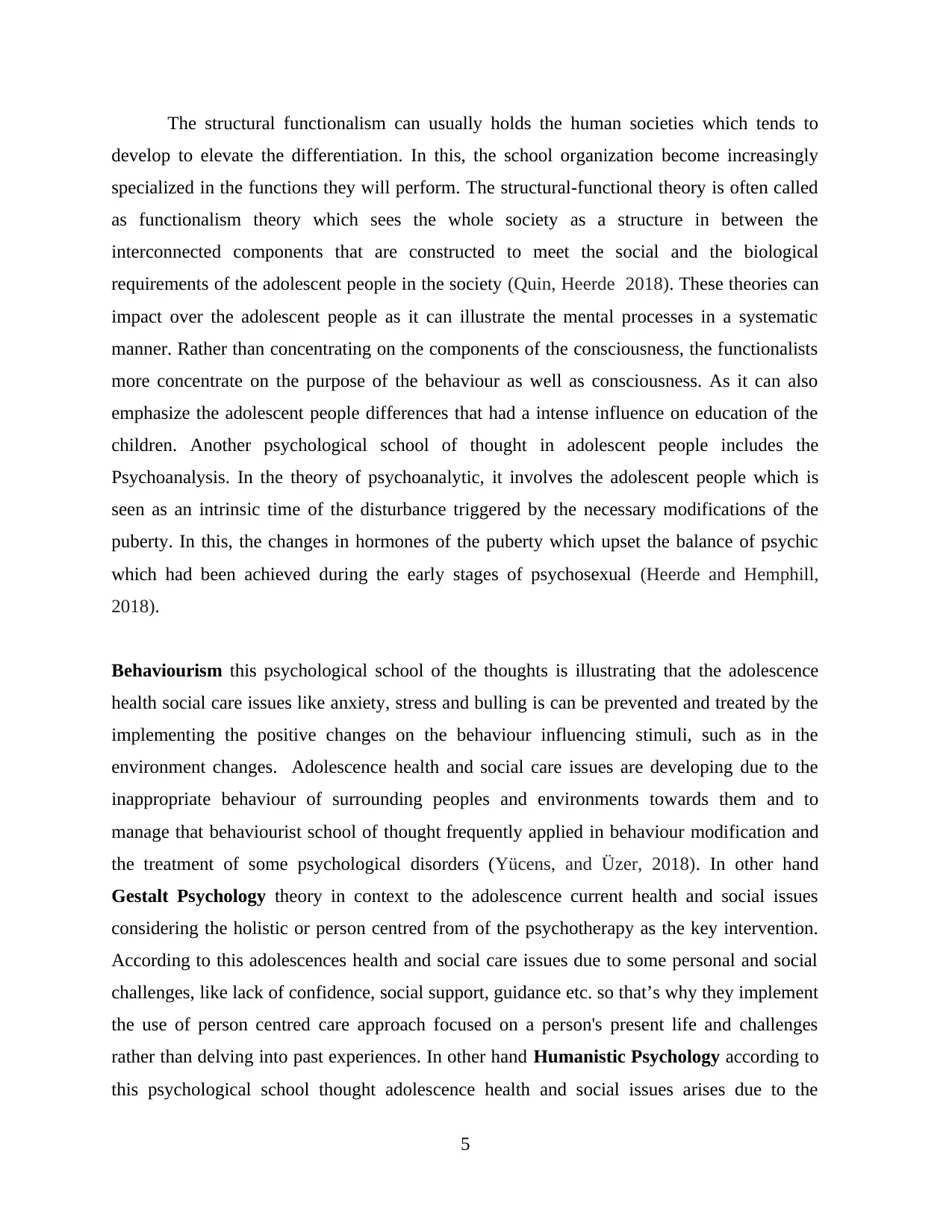
The structural functionalism can usually holds the human societies which tends to
develop to elevate the differentiation. In this, the school organization become increasingly
specialized in the functions they will perform. The structural-functional theory is often called
as functionalism theory which sees the whole society as a structure in between the
interconnected components that are constructed to meet the social and the biological
requirements of the adolescent people in the society (Quin, Heerde 2018). These theories can
impact over the adolescent people as it can illustrate the mental processes in a systematic
manner. Rather than concentrating on the components of the consciousness, the functionalists
more concentrate on the purpose of the behaviour as well as consciousness. As it can also
emphasize the adolescent people differences that had a intense influence on education of the
children. Another psychological school of thought in adolescent people includes the
Psychoanalysis. In the theory of psychoanalytic, it involves the adolescent people which is
seen as an intrinsic time of the disturbance triggered by the necessary modifications of the
puberty. In this, the changes in hormones of the puberty which upset the balance of psychic
which had been achieved during the early stages of psychosexual (Heerde and Hemphill,
2018).
Behaviourism this psychological school of the thoughts is illustrating that the adolescence
health social care issues like anxiety, stress and bulling is can be prevented and treated by the
implementing the positive changes on the behaviour influencing stimuli, such as in the
environment changes. Adolescence health and social care issues are developing due to the
inappropriate behaviour of surrounding peoples and environments towards them and to
manage that behaviourist school of thought frequently applied in behaviour modification and
the treatment of some psychological disorders (Yücens, and Üzer, 2018). In other hand
Gestalt Psychology theory in context to the adolescence current health and social issues
considering the holistic or person centred from of the psychotherapy as the key intervention.
According to this adolescences health and social care issues due to some personal and social
challenges, like lack of confidence, social support, guidance etc. so that’s why they implement
the use of person centred care approach focused on a person's present life and challenges
rather than delving into past experiences. In other hand Humanistic Psychology according to
this psychological school thought adolescence health and social issues arises due to the
5
develop to elevate the differentiation. In this, the school organization become increasingly
specialized in the functions they will perform. The structural-functional theory is often called
as functionalism theory which sees the whole society as a structure in between the
interconnected components that are constructed to meet the social and the biological
requirements of the adolescent people in the society (Quin, Heerde 2018). These theories can
impact over the adolescent people as it can illustrate the mental processes in a systematic
manner. Rather than concentrating on the components of the consciousness, the functionalists
more concentrate on the purpose of the behaviour as well as consciousness. As it can also
emphasize the adolescent people differences that had a intense influence on education of the
children. Another psychological school of thought in adolescent people includes the
Psychoanalysis. In the theory of psychoanalytic, it involves the adolescent people which is
seen as an intrinsic time of the disturbance triggered by the necessary modifications of the
puberty. In this, the changes in hormones of the puberty which upset the balance of psychic
which had been achieved during the early stages of psychosexual (Heerde and Hemphill,
2018).
Behaviourism this psychological school of the thoughts is illustrating that the adolescence
health social care issues like anxiety, stress and bulling is can be prevented and treated by the
implementing the positive changes on the behaviour influencing stimuli, such as in the
environment changes. Adolescence health and social care issues are developing due to the
inappropriate behaviour of surrounding peoples and environments towards them and to
manage that behaviourist school of thought frequently applied in behaviour modification and
the treatment of some psychological disorders (Yücens, and Üzer, 2018). In other hand
Gestalt Psychology theory in context to the adolescence current health and social issues
considering the holistic or person centred from of the psychotherapy as the key intervention.
According to this adolescences health and social care issues due to some personal and social
challenges, like lack of confidence, social support, guidance etc. so that’s why they implement
the use of person centred care approach focused on a person's present life and challenges
rather than delving into past experiences. In other hand Humanistic Psychology according to
this psychological school thought adolescence health and social issues arises due to the
5
Paraphrase This Document
Need a fresh take? Get an instant paraphrase of this document with our AI Paraphraser
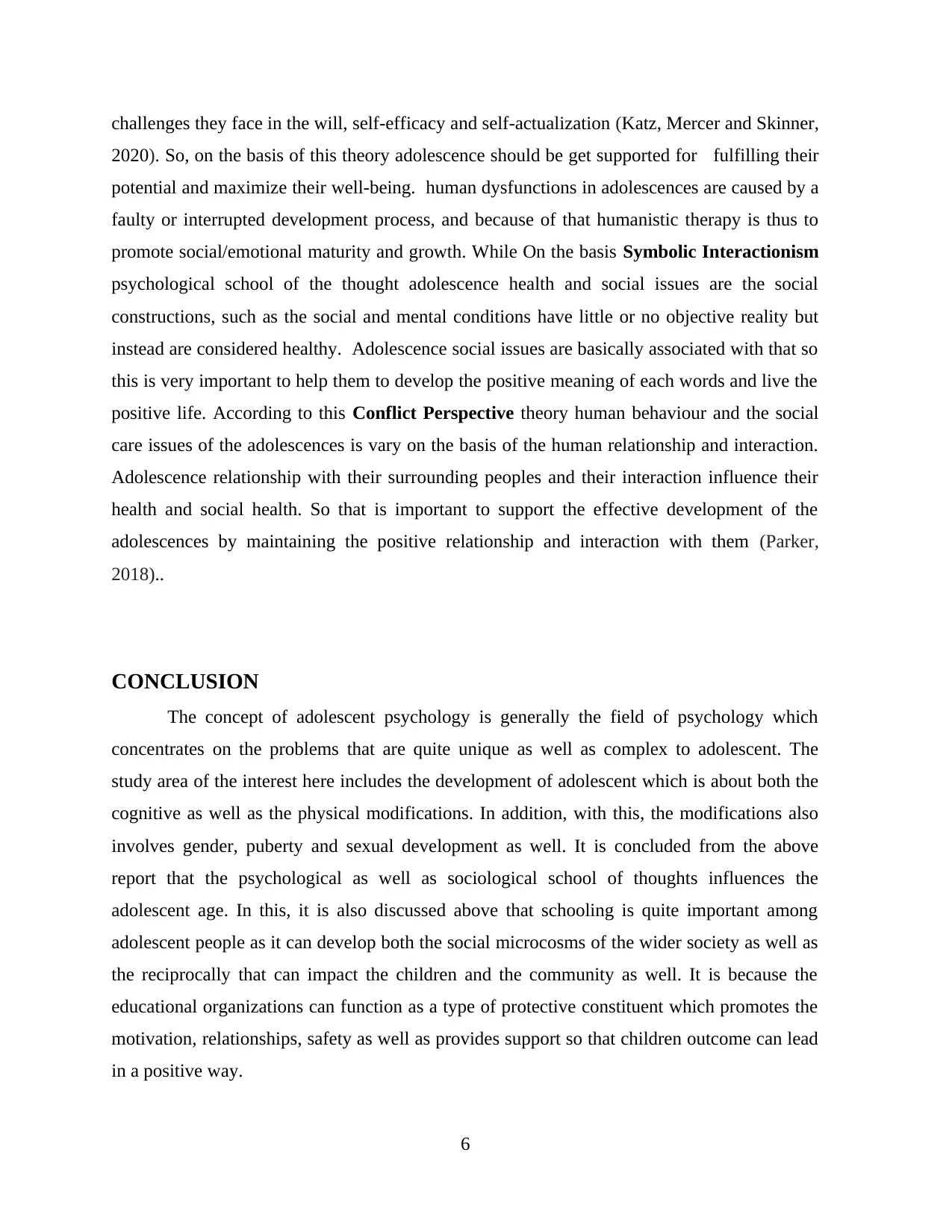
challenges they face in the will, self-efficacy and self-actualization (Katz, Mercer and Skinner,
2020). So, on the basis of this theory adolescence should be get supported for fulfilling their
potential and maximize their well-being. human dysfunctions in adolescences are caused by a
faulty or interrupted development process, and because of that humanistic therapy is thus to
promote social/emotional maturity and growth. While On the basis Symbolic Interactionism
psychological school of the thought adolescence health and social issues are the social
constructions, such as the social and mental conditions have little or no objective reality but
instead are considered healthy. Adolescence social issues are basically associated with that so
this is very important to help them to develop the positive meaning of each words and live the
positive life. According to this Conflict Perspective theory human behaviour and the social
care issues of the adolescences is vary on the basis of the human relationship and interaction.
Adolescence relationship with their surrounding peoples and their interaction influence their
health and social health. So that is important to support the effective development of the
adolescences by maintaining the positive relationship and interaction with them (Parker,
2018)..
CONCLUSION
The concept of adolescent psychology is generally the field of psychology which
concentrates on the problems that are quite unique as well as complex to adolescent. The
study area of the interest here includes the development of adolescent which is about both the
cognitive as well as the physical modifications. In addition, with this, the modifications also
involves gender, puberty and sexual development as well. It is concluded from the above
report that the psychological as well as sociological school of thoughts influences the
adolescent age. In this, it is also discussed above that schooling is quite important among
adolescent people as it can develop both the social microcosms of the wider society as well as
the reciprocally that can impact the children and the community as well. It is because the
educational organizations can function as a type of protective constituent which promotes the
motivation, relationships, safety as well as provides support so that children outcome can lead
in a positive way.
6
2020). So, on the basis of this theory adolescence should be get supported for fulfilling their
potential and maximize their well-being. human dysfunctions in adolescences are caused by a
faulty or interrupted development process, and because of that humanistic therapy is thus to
promote social/emotional maturity and growth. While On the basis Symbolic Interactionism
psychological school of the thought adolescence health and social issues are the social
constructions, such as the social and mental conditions have little or no objective reality but
instead are considered healthy. Adolescence social issues are basically associated with that so
this is very important to help them to develop the positive meaning of each words and live the
positive life. According to this Conflict Perspective theory human behaviour and the social
care issues of the adolescences is vary on the basis of the human relationship and interaction.
Adolescence relationship with their surrounding peoples and their interaction influence their
health and social health. So that is important to support the effective development of the
adolescences by maintaining the positive relationship and interaction with them (Parker,
2018)..
CONCLUSION
The concept of adolescent psychology is generally the field of psychology which
concentrates on the problems that are quite unique as well as complex to adolescent. The
study area of the interest here includes the development of adolescent which is about both the
cognitive as well as the physical modifications. In addition, with this, the modifications also
involves gender, puberty and sexual development as well. It is concluded from the above
report that the psychological as well as sociological school of thoughts influences the
adolescent age. In this, it is also discussed above that schooling is quite important among
adolescent people as it can develop both the social microcosms of the wider society as well as
the reciprocally that can impact the children and the community as well. It is because the
educational organizations can function as a type of protective constituent which promotes the
motivation, relationships, safety as well as provides support so that children outcome can lead
in a positive way.
6
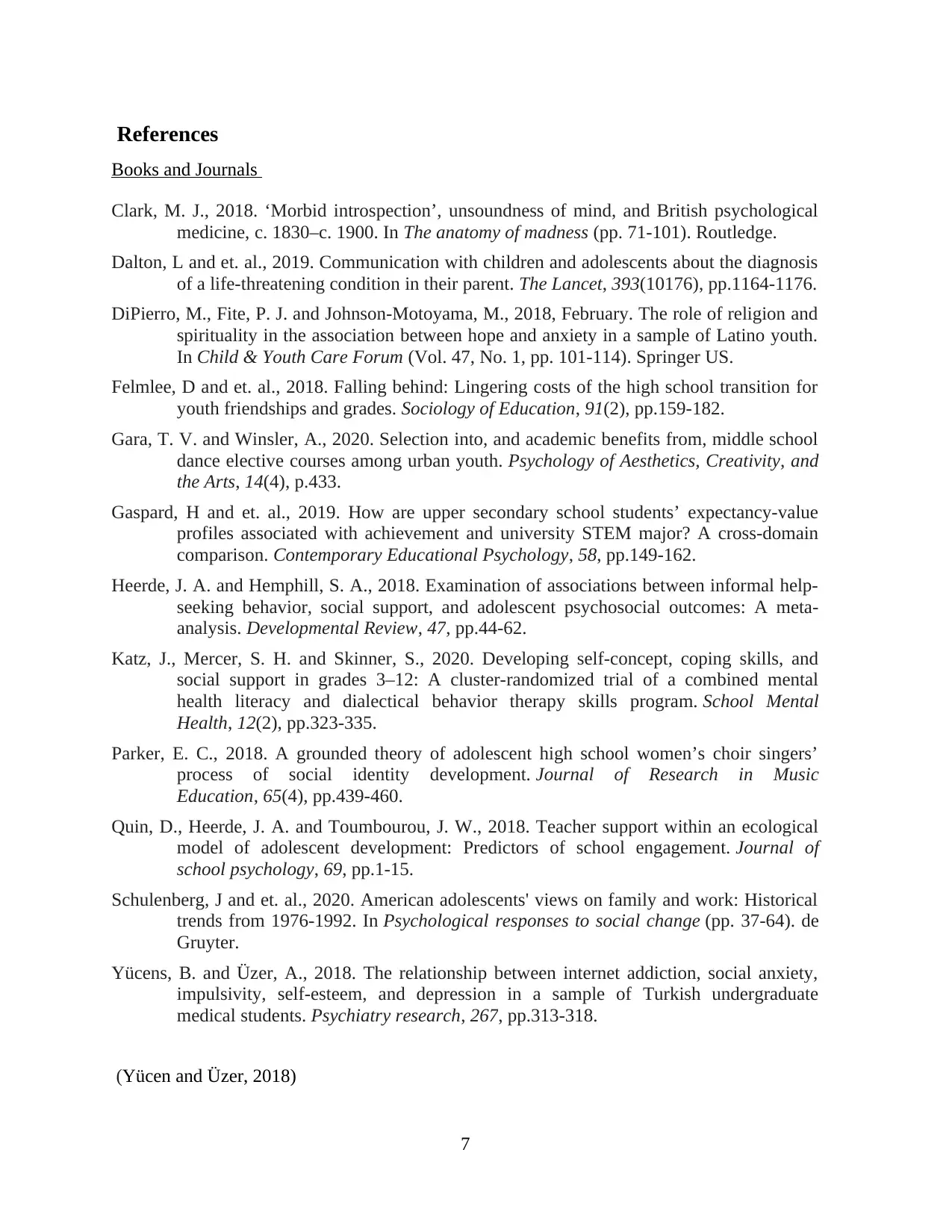
References
Books and Journals
Clark, M. J., 2018. ‘Morbid introspection’, unsoundness of mind, and British psychological
medicine, c. 1830–c. 1900. In The anatomy of madness (pp. 71-101). Routledge.
Dalton, L and et. al., 2019. Communication with children and adolescents about the diagnosis
of a life-threatening condition in their parent. The Lancet, 393(10176), pp.1164-1176.
DiPierro, M., Fite, P. J. and Johnson-Motoyama, M., 2018, February. The role of religion and
spirituality in the association between hope and anxiety in a sample of Latino youth.
In Child & Youth Care Forum (Vol. 47, No. 1, pp. 101-114). Springer US.
Felmlee, D and et. al., 2018. Falling behind: Lingering costs of the high school transition for
youth friendships and grades. Sociology of Education, 91(2), pp.159-182.
Gara, T. V. and Winsler, A., 2020. Selection into, and academic benefits from, middle school
dance elective courses among urban youth. Psychology of Aesthetics, Creativity, and
the Arts, 14(4), p.433.
Gaspard, H and et. al., 2019. How are upper secondary school students’ expectancy-value
profiles associated with achievement and university STEM major? A cross-domain
comparison. Contemporary Educational Psychology, 58, pp.149-162.
Heerde, J. A. and Hemphill, S. A., 2018. Examination of associations between informal help-
seeking behavior, social support, and adolescent psychosocial outcomes: A meta-
analysis. Developmental Review, 47, pp.44-62.
Katz, J., Mercer, S. H. and Skinner, S., 2020. Developing self-concept, coping skills, and
social support in grades 3–12: A cluster-randomized trial of a combined mental
health literacy and dialectical behavior therapy skills program. School Mental
Health, 12(2), pp.323-335.
Parker, E. C., 2018. A grounded theory of adolescent high school women’s choir singers’
process of social identity development. Journal of Research in Music
Education, 65(4), pp.439-460.
Quin, D., Heerde, J. A. and Toumbourou, J. W., 2018. Teacher support within an ecological
model of adolescent development: Predictors of school engagement. Journal of
school psychology, 69, pp.1-15.
Schulenberg, J and et. al., 2020. American adolescents' views on family and work: Historical
trends from 1976-1992. In Psychological responses to social change (pp. 37-64). de
Gruyter.
Yücens, B. and Üzer, A., 2018. The relationship between internet addiction, social anxiety,
impulsivity, self-esteem, and depression in a sample of Turkish undergraduate
medical students. Psychiatry research, 267, pp.313-318.
(Yücen and Üzer, 2018)
7
Books and Journals
Clark, M. J., 2018. ‘Morbid introspection’, unsoundness of mind, and British psychological
medicine, c. 1830–c. 1900. In The anatomy of madness (pp. 71-101). Routledge.
Dalton, L and et. al., 2019. Communication with children and adolescents about the diagnosis
of a life-threatening condition in their parent. The Lancet, 393(10176), pp.1164-1176.
DiPierro, M., Fite, P. J. and Johnson-Motoyama, M., 2018, February. The role of religion and
spirituality in the association between hope and anxiety in a sample of Latino youth.
In Child & Youth Care Forum (Vol. 47, No. 1, pp. 101-114). Springer US.
Felmlee, D and et. al., 2018. Falling behind: Lingering costs of the high school transition for
youth friendships and grades. Sociology of Education, 91(2), pp.159-182.
Gara, T. V. and Winsler, A., 2020. Selection into, and academic benefits from, middle school
dance elective courses among urban youth. Psychology of Aesthetics, Creativity, and
the Arts, 14(4), p.433.
Gaspard, H and et. al., 2019. How are upper secondary school students’ expectancy-value
profiles associated with achievement and university STEM major? A cross-domain
comparison. Contemporary Educational Psychology, 58, pp.149-162.
Heerde, J. A. and Hemphill, S. A., 2018. Examination of associations between informal help-
seeking behavior, social support, and adolescent psychosocial outcomes: A meta-
analysis. Developmental Review, 47, pp.44-62.
Katz, J., Mercer, S. H. and Skinner, S., 2020. Developing self-concept, coping skills, and
social support in grades 3–12: A cluster-randomized trial of a combined mental
health literacy and dialectical behavior therapy skills program. School Mental
Health, 12(2), pp.323-335.
Parker, E. C., 2018. A grounded theory of adolescent high school women’s choir singers’
process of social identity development. Journal of Research in Music
Education, 65(4), pp.439-460.
Quin, D., Heerde, J. A. and Toumbourou, J. W., 2018. Teacher support within an ecological
model of adolescent development: Predictors of school engagement. Journal of
school psychology, 69, pp.1-15.
Schulenberg, J and et. al., 2020. American adolescents' views on family and work: Historical
trends from 1976-1992. In Psychological responses to social change (pp. 37-64). de
Gruyter.
Yücens, B. and Üzer, A., 2018. The relationship between internet addiction, social anxiety,
impulsivity, self-esteem, and depression in a sample of Turkish undergraduate
medical students. Psychiatry research, 267, pp.313-318.
(Yücen and Üzer, 2018)
7

8
Secure Best Marks with AI Grader
Need help grading? Try our AI Grader for instant feedback on your assignments.

9
1 out of 11
Related Documents
Your All-in-One AI-Powered Toolkit for Academic Success.
+13062052269
info@desklib.com
Available 24*7 on WhatsApp / Email
![[object Object]](/_next/static/media/star-bottom.7253800d.svg)
Unlock your academic potential
© 2024 | Zucol Services PVT LTD | All rights reserved.





